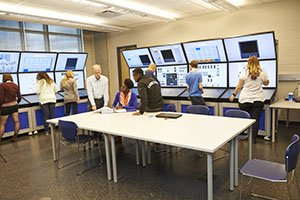UNENE MEng in Nuclear Engineering (Master's)
Overview
 The UNENE master's program is designed for the working professional, providing engineers the enhanced knowledge, tools, technology as well as business and management skills necessary to keep them at the forefront of their profession.
The UNENE master's program is designed for the working professional, providing engineers the enhanced knowledge, tools, technology as well as business and management skills necessary to keep them at the forefront of their profession. The UNENE Master of Engineering (MEng) program is designed for the working professional, providing engineers the enhanced knowledge, tools, technology as well as business and management skills necessary to keep them at the forefront of their profession. The program is course-based, consisting of 10 courses, or eight courses and an industrial project. The project is normally co-sponsored by the student's employer and one of the universities.
Courses in the UNENE MEng are offered on alternate weekends, usually over a seven-week period. The program consists of about 40 hours contact time plus 100 hours of homework. Students are formally evaluated through assignments, tests and exams. Courses can also be delivered using distance education tools to accommodate those students working at sites remote from the Greater Toronto Area.
For more information on UNENE and/or for course listings, please visit the .
Admissions
Admissions
UNENE requires an honours or four‐year degree in engineering, science or mathematics, and a B average (GPA: 3.0 on a 4.3 scale or 73 to 76 per cent) or better. UNENE also considers any relevant work or research history. Meeting the minimum requirements does not guarantee acceptance.
Required supporting documents:
Please see the for a list of supporting documentation that must be submitted with your application.
Required test scores for English language proficiency:
See for the minimum required test scores for this program.
Please see for specific dates. Note that the application deadlines listed are for both the online application and all supporting documentation.
Applications for admission to all graduate studies programs are submitted online. There are five steps you must go through to complete the application process. See for step-by-step instructions.
Many of our graduate programs are extremely competitive; the number of qualified applicants normally exceeds the number of seats available for each intake. Satisfaction of minimum entry requirements does not ensure admission.
Additional information
- Loading...
- Loading...
- Loading...
- Loading...
- Loading...
- Loading...
- Loading...
- Loading...
- Loading...
- Loading...
- Loading...
- Loading...
- Loading...
- Loading...
- Loading...
- Loading...
- Loading...
- Loading...
- Loading...
- Loading...
- Loading...
Internal awards and funding
Applicants to research-based graduate programs who are studying full-time are automatically considered for some types of funding at the time of admission.
Types of funding that do not require an application:
- Entrance scholarships
- Minimum funding packages
- Teaching assistantships, research assistantships and graduate research assistantships
For more details on the above funding opportunities, see .
Please note: Part-time students are not eligible for the above funding opportunities.
External awards and funding
Graduate program applicants are encouraged to apply for to help finance their education. The application process differs for each competition, so review the information carefully to determine where and when you must apply. Please note: The majority of these awards are for domestic or permanent residents only.
Tuition fees for graduate programs are charged on a flat-fee or fee-per-credit basis and vary by program and student status.
For current, specific fees and details on flat-fee versus fee-per-credit programs, please see .
Contact the program:
Faculty of Engineering and Applied Science
905.721.8668 ext. 2988
grad.engineering@ontariotechu.ca
Contact the School of Graduate and Postdoctoral Studies:
905-721-3190
connect@ontariotechu.ca